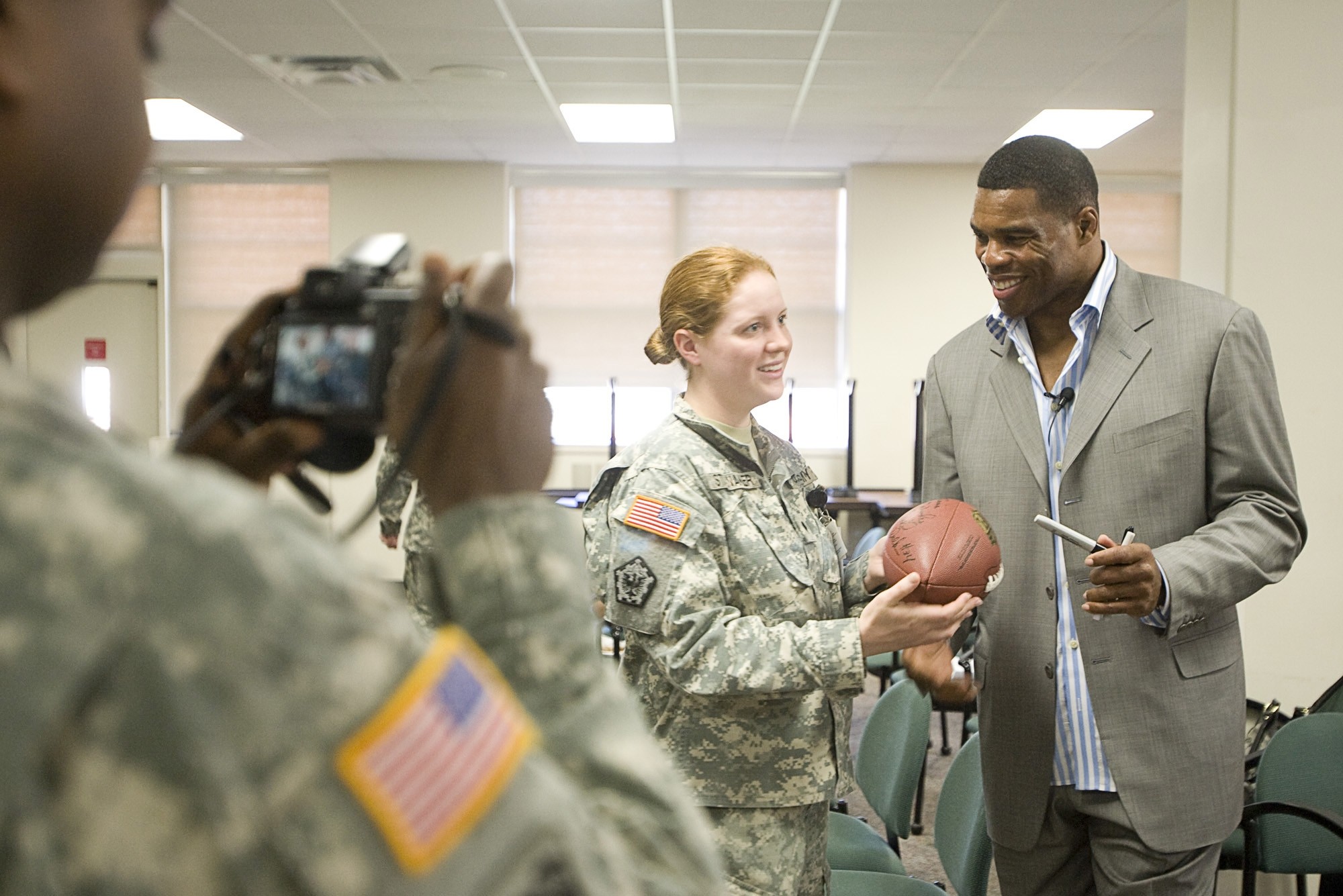
FORT MEADE, Md. (Army News Service, April 9, 2010) -- Herschel Walker is the last person most people would think of as mentally ill.
In 1982, as a junior at the University of Georgia, Walker was awarded the Heisman Trophy. He later became a professional football player, joining the Dallas Cowboys, the Minnesota Vikings and the Philadelphia Eagles over the next 14 years.
In 2002, Walker was voted into the Collegiate Football Hall of Fame.
So when Walker told a group of about 30 Soldiers from the Warrior Transition Unit here that he was diagnosed with dissociative identity disorder after his football career ended, the reaction of many Soldiers was not one of surprise, but of admiration.
Walker spoke to the Soldiers during an informal gathering March 17 at Kimbrough Ambulatory Care Center.
"He has a disorder. It is encouraging that he faced a problem and got through it," said Pvt. Kaliappan Stubbs, who was wounded in Iraq and has been a part of the WTU for seven months.
Today, the former NFLer is a spokesperson for the Freedom Care Program at University Behavioral Health of Denton, Texas. The program provides treatment programs for mental health and chemical dependency problems among servicemembers, veterans, retirees and their families.
Walker was diagnosed with DID, also known as multiple personality disorder, about a decade ago. According to the National Alliance on Mental Illness, people with the disorder have more than one distinct identity or personality state that surfaces on a recurring basis. The disorder is believed to be triggered as a response to trauma or abuse and is usually treated by a combination of psychotherapy and medication.
"I'm blessed with DID," Walker said. "We all have problems ... you can't hide a problem. It's not going to do you any good."
Capt. Jaison Bloom, commander of the WTU, said Walker's courage in talking about his mental illness and about the importance of getting treatment is a valuable message. The captain said about 40 percent of the WTU Soldiers have a mental illness as a primary or secondary diagnosis.
Using self-deprecacting humor, Walker recalled how he was bullied by his peers as an overweight child growing up in Wrightsville, Ga. He also struggled with stuttering, and his teachers often separated him from other students in the class.
"I walked with my head down," Walker said.
But his parents, particularly his mother, encouraged him and taught him the importance of faith.
One day, Walker said, he decided he was no longer a victim. He started doing push-ups, sit-ups and chin-ups and began reading books at the library.
In time, his physique and speech improved. As a high school student, Walker played football and basketball and competed in track and field. He scored a record-breaking 85 touchdowns as a running back and led his teams to state championships in both football and track, while maintaining his grades. Walker graduated at the top of his class and became one of the most sought-after high school football players in the nation before choosing to attend the University of Georgia in Athens, Ga.
Before his mental illness diagnosis, Walker said he began to notice his fierce temper. According to his memoir, "Breaking Free," he threatened his wife and others with violence, but he could not remember the events. Walker said he finally realized there was a problem when he grabbed his gun one day in response to anger sparked by a late auto delivery to his home.
"I needed help," Walker said, stressing mental illness should not be considered a stigma. "There can't be any shame in my game."
After beginning treatment, Walker said he is now in recovery. "You have to have faith that when you go into recovery, you're going to get better," he said. "I thought I was a strong man earlier in my career, but now I'm powerful."
Col. Christopher M. Castle, commander of Kimbrough, said the Army is working to change how mental health care is perceived by Soldiers. He praised Walker for advocating for the mentally ill and working to erase the stigma associated with mental illnesses and treatment.
Walker's easy humor continued at the end of his presentation when he answered questions from the audience. Julia Bennett, a booking agent for the Kimbrough call center, said she was a diehard Redskins fan and wondered if he thought the team would finally make it to this year's Super Bowl.
"Everyone has a problem," Walker said. "But you're going to overcome it."
The room filled with the sound of laughter.
(Editor's note: Some information for this article was taken from www.achievement.org.)

Social Sharing